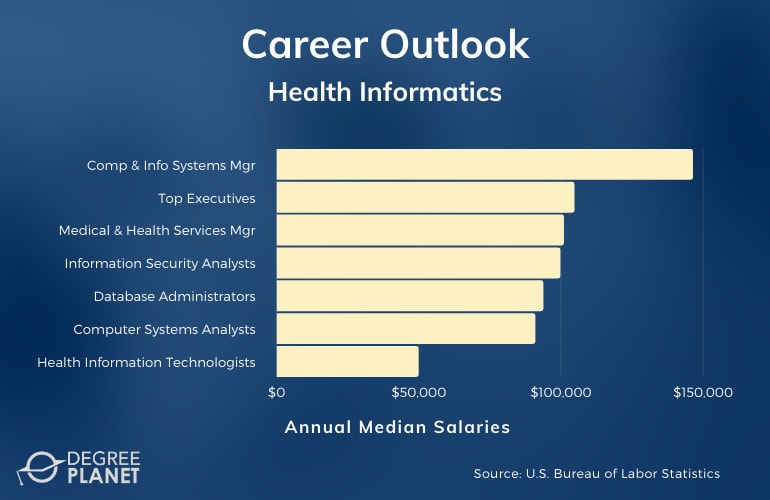Is a masters in health informatics worth it? A master’s degree in health informatics might be a smart choice for you if you’re intrigued by data and technology, and you’re driven to make a difference in healthcare.

Editorial Listing ShortCode:
Managerial jobs in healthcare are increasing at a quick pace. Having a master’s degree in health informatics may help you secure one of those positions along with a significant salary bump.
Is a Masters in Health Informatics Worth It?

Yes, a Master’s in Health Informatics is worth it for many professionals. According to the Bureau of Labor Statistics, healthcare jobs are set to grow at 15% over the next 10 years, much faster than the average for all occupations.
Common health informatics careers in this field include medical records and health information technician, medical and health services manager, top executive, information security analyst, and database administrator. Health informatics professionals specialize in technology platforms for medical recordkeeping.
The systems that they develop and maintain keep medical records organized, secure and easily retrievable. Safe, accurate, and organized recordkeeping can improve healthcare outcomes, manage costs, and improve efficiency. The healthcare field is experiencing enormous job growth.
The more people there are who need medical care, the greater the need for administrative and technology professionals who can manage the many records involved. For that reason, getting a master’s in health informatics may lead to multiple job opportunities and high salary potential.
Editorial Listing ShortCode:
For many people in this field, working as a medical records or health information technician is a good starting point. With a master’s degree, you’ll have the potential to move much further up in leadership and management. Also, a number of professionals in the field pursue a traditional or online PhD in Health Informatics as way to help boost their leadership and management skills.
Medical and health services management is one of the fastest-growing jobs in healthcare today. Health information managers fall into that category, and an informatics master’s degree would prepare you well for the role.
These jobs are available in hospital systems, physicians’ groups, residential facilities, and outpatient surgical centers. Government agencies also hire health services managers.
With this education and plenty of experience, you might eventually move into an executive position in your healthcare organization. As chief information officer, you’d have authority in technology and data-related decisions.
How to Decide Whether a Masters in Health Informatics is Right for You

Health informatics is an exciting field, so it may be worth considering whether a masters degree in health informatics would be a good fit for you. To help you decide, consider your interests, your abilities, and your career goals.
1. You’re interested in healthcare but not clinical work.
When most people think of healthcare workers, they think of doctors and nurses. The healthcare field is much broader than that, though. There are a good deal of administrative and managerial professionals working behind the scenes to keep healthcare facilities running.
If you care about people’s health and want to contribute to their wellness, you aren’t locked into becoming a clinical practitioner. Health informatics offers a different route to patient care.
In this line of work, you can help make sure medical facilities have well-organized computer systems and valuable data. When a provider has access to accurate information, it can be tailored to a patient’s medical history and individual needs. Data analysis can also contribute to more efficient operations and better cost control.
2. You have a knack for computers and technology.

Health informatics professionals have to know their way around computers and databases. A master’s program can help you learn such skills, but starting graduate school with some computer savvy certainly won’t hurt.
Your program may include classes on database security, machine learning, computer networks, and data mining. Those are tech-heavy classes that may be a great fit for students with a mind for computers.
In fact, you may be thinking about an informatics degree as an alternative to a program like computer science or information technology. Health informatics may be a way for you to foster similar skills while contributing to society through healthcare excellence.
3. You want to move beyond entry-level jobs in health information.
You may already have experience in the health information field. Many entry-level jobs in medical records and health information require only an associate degree or a bachelor’s degree.
Editorial Listing ShortCode:
While those jobs can be fulfilling, you might not be satisfied with your pay. According to the Bureau of Labor Statistics, the average salary for that job category is $44,090. With a master’s degree, you might be able to move into a managerial role that would pay thousands more each year.
5 Things You Can Do with a Masters in Health Informatics
A health informatics degree can help propel you toward a variety of different jobs in the healthcare and technology sectors. Your specialized training may qualify you for a managerial role with a rewarding salary.
1. Database Administrator

Professionals who maintain database systems and take charge of the information that they contain are often known as database administrators. In this job, you might be tasked with database operations and upgrades. You might also be in charge of guarding against data loss.
Both medical facilities and health insurance companies can use database administrators. Your skills might also translate to non-healthcare settings, such as schools or tech companies.
2. Information Security Analyst

Patient data must be collected and stored in accordance with privacy laws. A cybersecurity breach could allow confidential patient information into the wrong hands, so healthcare organizations must strive for network and database security.
As an analyst, your primary job would likely be to keep a close eye on the integrity of your systems and implement solutions for weaknesses that you find. You might also develop mitigation plans to use if a breach does occur.
3. Medical and Health Services Manager

Leaders in healthcare settings oversee operations and personnel within their departments. To qualify for managerial roles, you might need experience as well as a graduate degree.
As an informatics expert, you might be in charge of the medical records department and carry a title like health information manager. You might be tasked with ensuring your organization’s compliance with laws about data privacy and electronic medical records.
4. Medical Records and Health Information Technician.

Professionals in this field use computer systems to record and maintain patient data. Some technicians are also responsible for analyzing the data that is input into their systems. Common workplaces include hospitals and doctor’s offices.
Entry-level jobs are available, but there is also room for advancement. Industry certifications are one way to grow your responsibilities, and a college program, such as a master’s degree in health informatics, may lead to a supervisory position.
5. Top Executive
Because information and technology are critical to the smooth functioning of healthcare facilities, your skills may lead to a top spot in your organization’s leadership.
Editorial Listing ShortCode:
An executive role for which you might be particularly well suited is that of chief information officer. As CIO, you might be in charge of all of the organization’s IT or informatics staff and oversee technology systems. Chief technology officer is a similar title.
Master’s in Health Informatics Degree Alternatives

A health informatics master’s degree isn’t the only way to grow your leadership potential. You might also find success with one of these alternatives.
- Master’s in Information Technology. If you want the option to work in settings other than healthcare, you may prefer to get an IT degree. This degree typically covers similar topics but without the healthcare focus.
- Master’s in Healthcare Administration. For those who aren’t technology buffs, there are other healthcare leadership opportunities available. Administrators oversee staffing and quality management in healthcare facilities.
- MBA in Healthcare Management. An MBA program can help you gain expert knowledge in a variety of business disciplines, including marketing, finance, IT, and management. A healthcare concentration can help prepare you to apply those business principles in medical settings.
Exploring different programs from various universities may help you decide which of these degree options is the best one for you.
Health Informatics Careers & Salaries

According to the Bureau of Labor Statistics, medical and health services managers, including health information managers, earn an average annual salary of $104,280. With an estimated 32% growth rate in the next decade, the health informatics job outlook is promising.
| Careers | Annual Median Salaries |
| Computer and Information Systems Managers | $151,150 |
| Top Executives | $107,680 |
| Medical and Health Services Managers | $104,280 |
| Information Security Analysts | $103,590 |
| Database Administrators | $98,860 |
| Computer Systems Analysts | $90,920 |
| Health Information Technologists and Medical Registrars | $51,840 |
| Medical Records and Health Information Technicians | $44,090 |
| Medical Secretaries and Administrative Assistants | $37,350 |
| Information Clerks | $31,110 |
Earning a master’s degree in health informatics may qualify you for many of these higher-paying jobs, and earning industry certifications can help accelerate your career advancement as well.
Getting Your Masters in Health Informatics Degree Online

The need for healthcare leaders is growing quickly. Getting your health information management degree online now can help you be ready for positions as they open up.
The healthcare field presents a unique opportunity to use your IT skills to benefit others’ wellbeing. An online healthcare informatics degree program can help prepare you to lead data and technology teams in hospitals, doctor’s offices, government agencies, nursing homes, or health insurance companies.
Your expert leadership may influence the quality of care that patients receive and keep costs in check. Prepare to make a difference by earning your master’s in health informatics from an accredited university.

